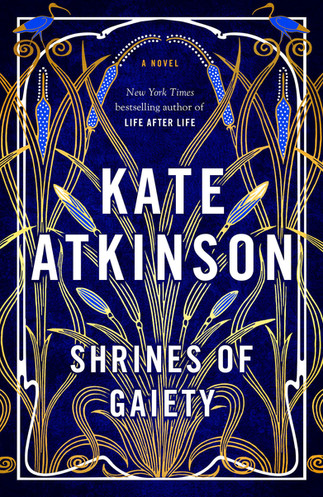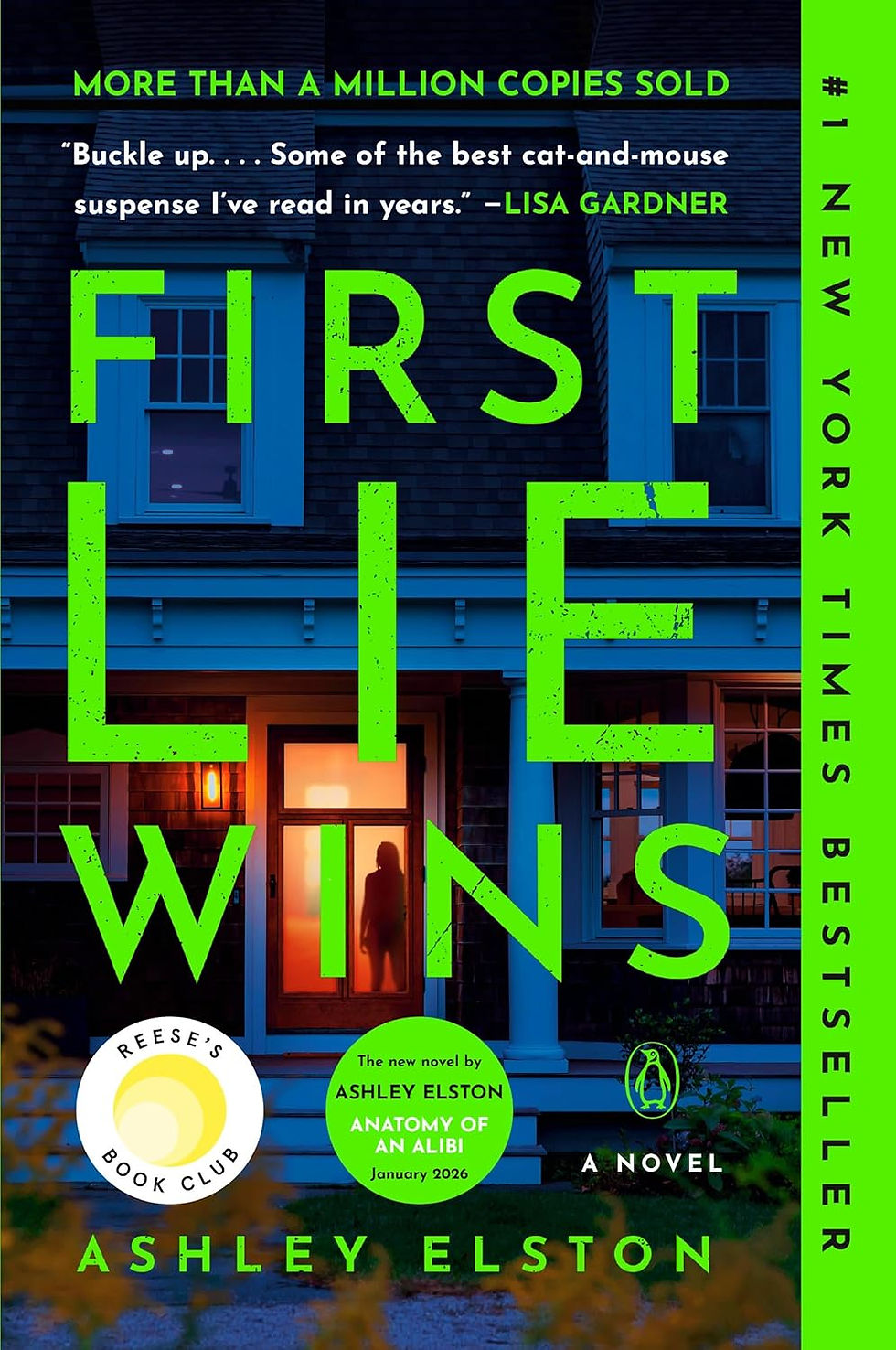December Wrap-Up: My Favorite Reads of the Month
- The Bossy Bookworm

- Dec 30, 2022
- 6 min read
My very favorite December reads!
Here are my six favorite reads of the past month: a book that plays with time, a book that plays with memory, a musician's memoir, Roaring Twenties-set historical fiction, postapocalyptic fiction, and the newest in a young adult mystery series. This feels like the most representative mix of Bossy Favorite Genres ever!
If you've read any of these, I'd love to hear what you think!
And I'd also love to hear: what are some of your recent favorite reads?
01 Lost in Time by A.G. Riddle
A.G. Riddle's time-travel story centers around reconciling the inability to change what has already occurred with the necessity of doing so to save loved ones. With a twist!
I love a time-travel book (see lists of some of my favorites, linked below).
In A.G. Riddle's 450-page multiple-timeline story Lost in Time, a group of scientists have developed a device called Absalom. First intended to revolutionize shipping, its limitations and its vast possibilities lead to a new purpose: to send dangerous criminals back in time.
When Sam, one of the creators of the system, is framed for the murder of another creator, he finds himself about to be sent back in his own creation as punishment. But his physicist friends are determined to try to get him back to the present again somehow.
I was a little uncomfortable with what seemed like the characters' inability to consider that human life always ends, that that is what makes it precious, and that actively manipulating outcomes related to life and death on the scale presented in the story might be problematic and irresponsible.

I did not see the fascinating twist of the book coming, and it's laid bare for the reader relatively early. I don't pretend to have succeeded in comprehending the heart of the time-travel premise here, but it was all interesting to contemplate.
For my full review, check out Lost in Time.
02 The Light Pirate by Lily Brooks-Dalton
This was my favorite read of the month!
This gorgeously written postapocalyptic climate-fiction story offers up a future in which civilization buckles to the destructive power of weather and ocean while certain species thrive in the extreme changes and shifted conditions.
This is a beautifully written novel with a haunting postapocalyptic tone and vivid setting. The shadow of real-life global warming and weather changes add to the power of the story, and the touch of magical realism is both essential to the plot and a lovely element.
The characters of Frida and neighbor Phyllis are irresistible, and I loved the ways in which they adjust, adapt, grieve, press on, and form a makeshift family out of friendship.

The way the sea persistently erodes all evidence of civilization kept reminding me of the Talking Heads song "Nothing But Flowers," and Brooks-Dalton's climate fiction descriptions of living with water, exposed to weather, and within the parameters of extreme heat and the safety of darkness were striking.
The Light Pirate offers unexpected redemption, tragedy, and some beautiful resolutions.
Click here for my full review of The Light Pirate.
03 The Box in the Woods (Truly Devious #4) by Maureen Johnson
The fourth mystery in Johnson's Truly Devious series delivers more smart, creative sleuthing from Stevie Bell and the gang, great dialogue, twisty events, unsolved elements from the past and present, and a denouement I didn't predict.
“...hear me out. This whole thing is ticking a lot of the horror movie boxes. Murder at a sleepaway camp. A serial killer. A final girl. A kid who died because some teenagers were being irresponsible.”
The Box in the Woods is another smart, funny, intriguing young adult mystery from Maureen Johnson.
This stand-alone novel from the author of the Truly Devious trilogy (Truly Devious, The Vanishing Stair, and The Hand on the Wall) follows the irresistibly single-minded, gifted, wonderfully oddball Stevie Bell as she takes her sleuthing skills outside of Ellingham Academy for the first time.

Johnson sets up a premise in which a number of Stevie's friends from Ellingham are reunited to work at the camp and be together. This allows for the cooperative problem-solving that I adore in the rest of the series.
Her friends' talents and support buoy Stevie's unique ability to piece together details and see the truth. (And Nate might even be writing again, if his irritating young superfan camper Lucas has anything to do with it.) The secondary characters of Lucas(!), Allison, Nate, Janelle, and David--and their dialogue--are fantastic as always.
Click here for my full review of The Box in the Woods.
04 Tell Me an Ending by Jo Harkin
Harkin's fascinating debut speculative fiction considers a memory clinic that erases and reinstates memories at clients' requests, the impact of painful experiences on building the self, and the potential repercussions of tinkering with your recall of the past.
In Jo Harkin's debut novel world, many have elected to have the company Nepenthe remove traumatic or upsetting memories through a relatively new procedure. The key memory and all connected elements are eliminated, presumably allowing these individuals to plow back into their lives unencumbered by upsetting past mistakes or experiences.
But some clients are beginning to have flashes of their erased memory, "traces" that disturb and confuse them, and the company providing the service seems to be keeping secret some highly negative effects on some patients.

Secrets and lies swirl throughout this book and the plot zings along. Harkin digs into her characters and their brokenness, heartache, and mistakes, but also their love, joy, resilience and ability to transcend tragedy, and persistent hope.
I love fiction about memory and how it shapes us, and I thought Harkin's Tell Me an Ending was wonderful. I was captivated by the various situations, secrets, how memory is connected to a sense of self, and the complicated web of memories, experience, personality, and hopes and dreams that make us who we are.
Please click here for my full review of Tell Me an Ending.
05 Shrines of Gaiety by Kate Atkinson
Atkinson's newest mystery is set in vivid Roaring Twenties London as Nellie Coker struggles to hold on to her empire of clubs while mysterious dark undercurrents threaten stability throughout the city.
It's 1926 in London, and recovery from the Great War inspires many in the city to dive into the wild nightlife scene and revel in the frenzy of the Jazz Age.
Nellie Coker is fresh out of jail and ready to jump back into the action, masterminding moves to increase her family's power, influence, and riches.
But not everyone she's paying off can be trusted, some of her six children are undermining her, and goings-on in the dark undercurrents of Soho could shake Coker's hold on her empire--and upset her ambitious dreams.
On the other side of the Shrines of Gaiety story line is Detective Frobisher, an upstanding outlier in the largely corrupt police force, and his unlikely assistant in investigating Ma Coker, former librarian Gwendolen Kelling.

I was particularly hooked by the intersection of Gwendolyn and Ma Coker's golden child, her eldest son Niven--along with the mystery of missing girls across Roaring Twenties London, plus deadly high stakes, the dealings of various crooks, and significant double-crossing throughout the story.
For my full review and for links to Bossy reviews of other Atkinson books, please check out Shrines of Gaiety.
06 Surrender: 40 Songs, One Story by Bono
Thoughtful, self-deprecating, earnest, and honest, Surrender is a captivating peek into the four decades (and counting) of U2. Bono explores his faith, family, loyalty, musical inspirations, and important activism efforts.
I prefer listening to my memoirs read by the author, and I loved hearing U2's songwriter and lead singer Bono take us through the stumbles, pain, joy, and faith that have inspired his music and shaped his life.
From treasuring friends he's had since childhood (one of whom was the inspiration for the song "Bad"), to exploring "growing up in Ireland in the seventies with my fists up (musically speaking)"; from digging into the difficult relationship with his father to sharing how he attempted to cope with the loss of his mother decades after the fact, Bono's Surrender is beautifully honest, self-deprecating, and fascinating.

Details of Bono's activism make up much of the second half of the book. He is interested in the potential power of his celebrity to do good, in learning about worthwhile issues without ego, and in being actively involved in improving the lives of others around the world.
For my full review (and for links to other musicians' memoirs I've loved), check out Surrender.






















Comments